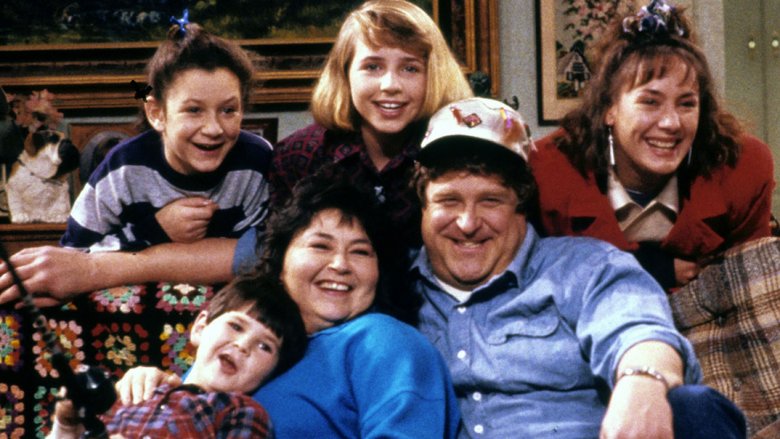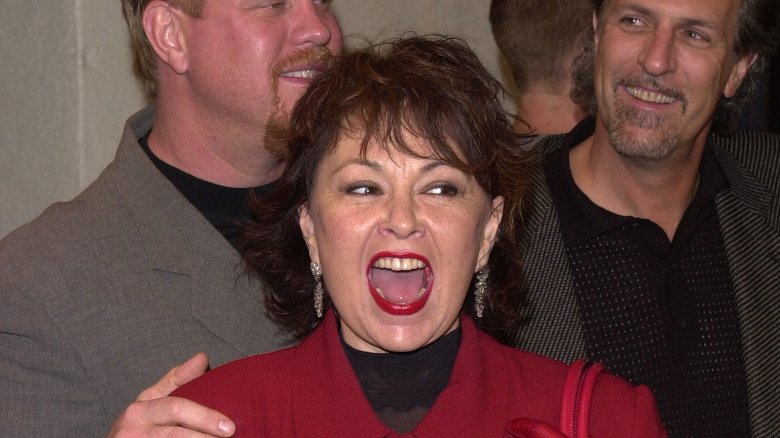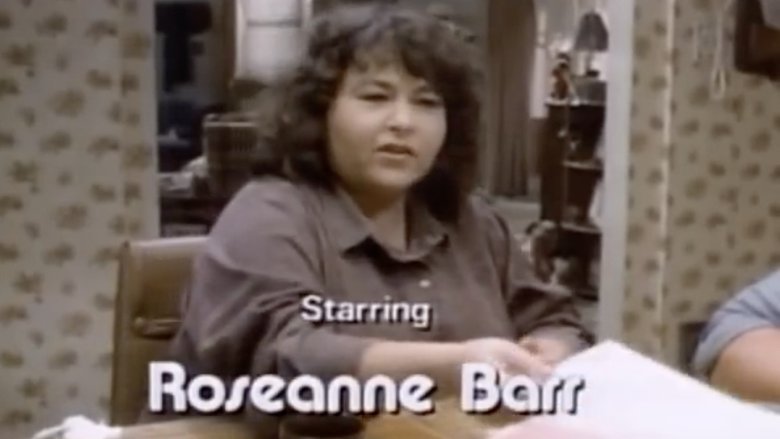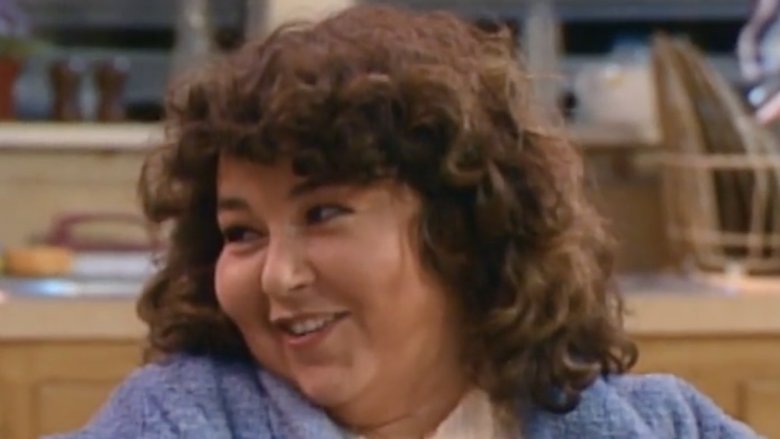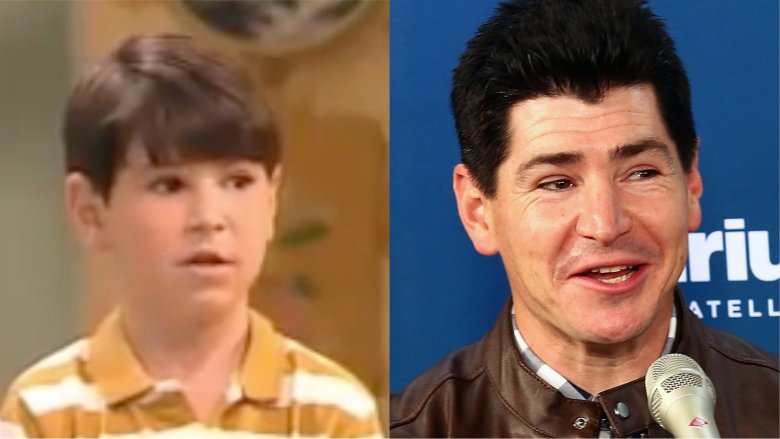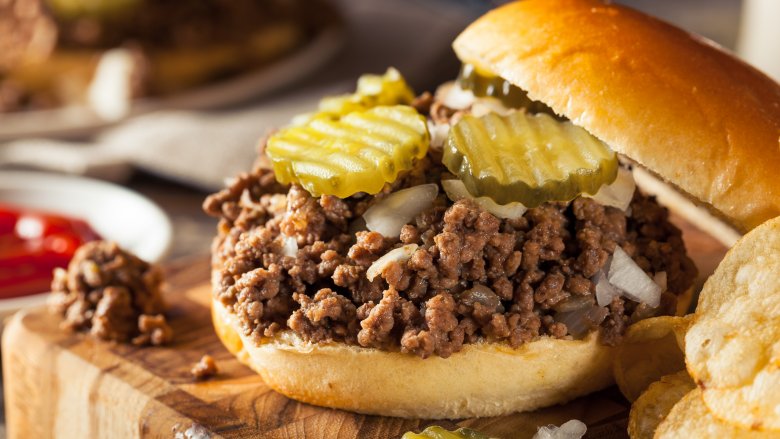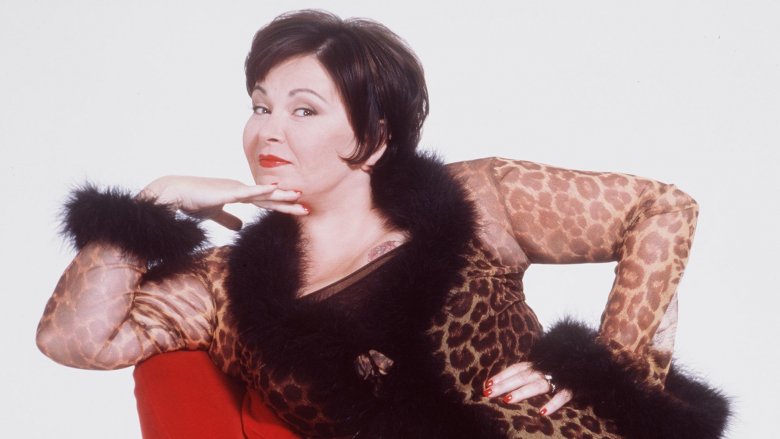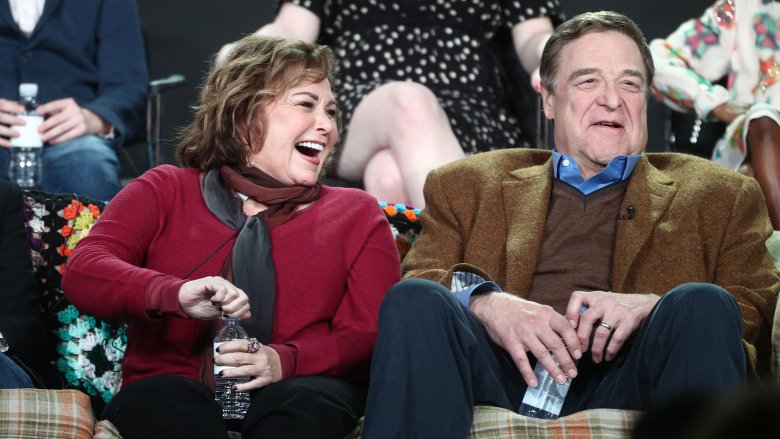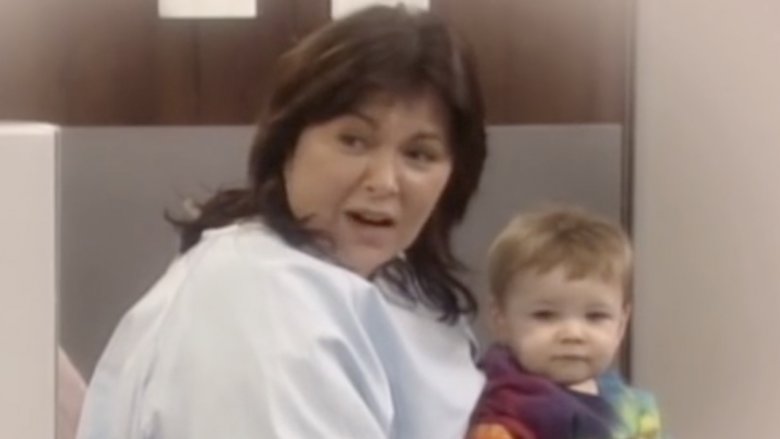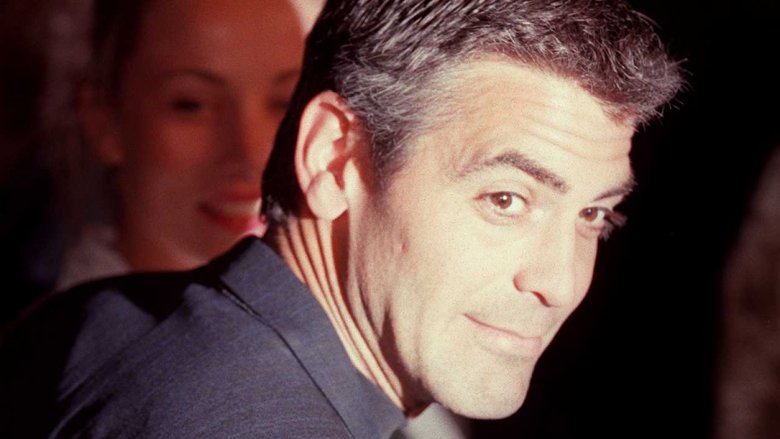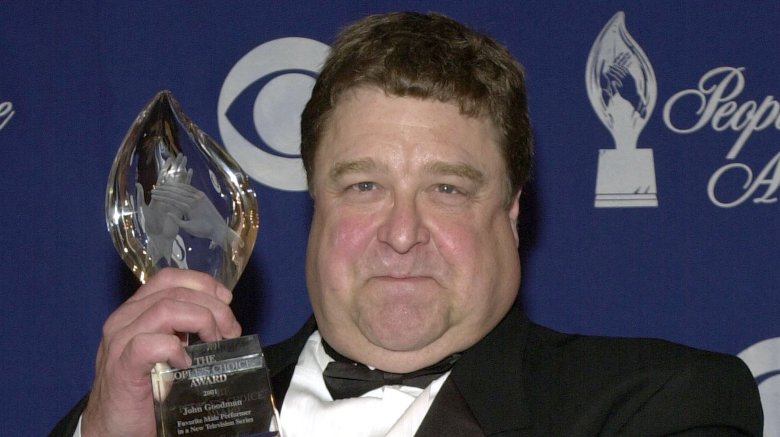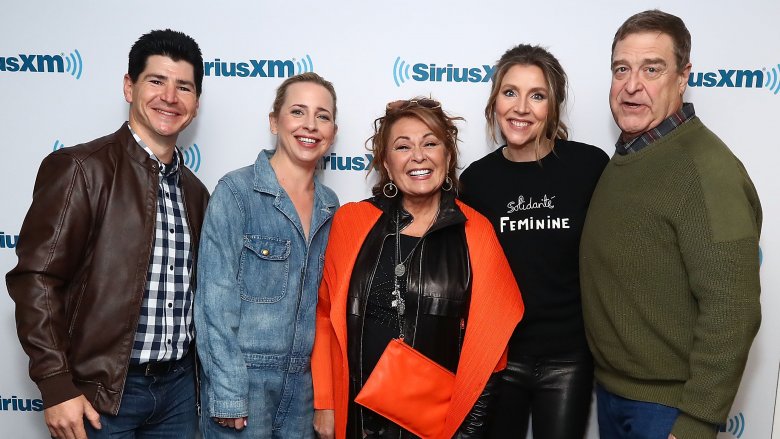The Untold Truth Of Roseanne
Roseanne was a revelation when it hit the air in 1988. Starring the razor-sharp stand-up comedian and self-proclaimed "domestic goddess" Roseanne Barr, aka Roseanne Arnold, aka just Roseanne, the show was one of the first to depict the way millions of real Americans live — with financial problems, irksome children, and situations that don't get resolved in 22 minutes. It dominated the TV ratings in the '80s and '90s, made huge stars out of Barr, John Goodman, Sara Gilbert, Johnny Galecki, and Laurie Metcalf, successfully juggled two Beckys ... and it returns to TV in 2018. Here's a look behind the scenes of this smash sitcom.
The show was conceived before Roseanne was cast
In the late '80s and early '90s, it was common to build a show around a stand-up, like The Cosby Show, Seinfeld, or Tim Allen's Home Improvement. Roseanne certainly feels like it was based on the act of Roseanne Barr, a wife and mom who joked about that lifestyle on stage, but she was actually cast in a role that TV producers Marcy Carsey and Tom Werner had already conceived.
"The way we develop shows is that we look at what's not on television, and what ought to be. What wasn't on at the time was anything about a working mother." Carsey told the Archive of American Television. "We knew we needed a loud and interesting and unique and in-your-face kind of presence to take it to the more outrageous end of the spectrum." Werner suggested a comedian they'd both seen (and thoroughly enjoyed) on The Tonight Show: Roseanne Barr.
The star vs. the creator
When Roseanne went into production, it wasn't called Roseanne — the pilot script was called Life and Stuff, and Matt Williams, the guy who wrote it, intended for the show to be an "ensemble piece" over which he could have some control, as opposed to a vehicle for Barr, even though her comedic voice strongly influenced the series. The latter is exactly what Barr wanted (and got), thus launching a bitter power struggle between her and Williams, the show's head writer and co-executive producer.
In December 1988 —in the middle of Roseanne's first season — Barr threatened to quit the show after 13 of the 22 ordered episodes had been completed ... unless Williams got the boot. Williams got the boot, but people who worked on the show told the Los Angeles Times that producers almost did let Barr walk because she would allegedly launch into angry tirades on the set, lock herself in her dressing room, or leave the studio at a moment's notice. Producers and writers figured that if and when Roseanne did leave Roseanne, they'd just reconfigure it to be a showcase for John Goodman.
The star vs. the writers
Why was Roseanne such a great show? It had great writing, and that might have been because Roseanne Barr (and later, her husband and creative partner, Tom Arnold) put a ton of pressure on the writers. After the show's staff would finish a script and the cast would do its initial read-through, Barr would reportedly re-write the script herself. That injected a lot of fear, resentment, and other negative emotions into the writers' room, which Barr later attributed (via Entertainment Weekly) to writers having "a lot of emotional problems."
After observing that her writers would "only laugh at the jokes they wrote" at the read-throughs, Barr reportedly assigned numbers to each member of the staff and would only refer to them by their designated number. Roseanne writer Amy Sherman-Palladino, who would go on to create acclaimed shows such as Gilmore Girls and The Marvelous Mrs. Maisel, said her nickname was "2."
"The writers did not think it was funny," Sherman-Palladino told Entertainment Weekly. "Anytime you tell someone, 'I'm not going to learn your name, here's your number,' you're diminishing their worth." Roseanne writer and future Buffy the Vampire Slayer creator Joss Whedon called the set "a brutal environment."
Too many DJs!
Michael Fishman was not the first actor to play the third-born Conner kid, D.J., nor was he the first actor considered. Producers nearly went with another strong candidate, a very talented youngster named Macaulay Culkin (who went on to star in the hit Home Alone movies), before deciding on Sal Barone (who now works as a sound man.)
Barone played D.J. in the pilot, but it didn't work out, so Roseanne Barr got her first choice after all. "I wanted Michael Fishman because he looked like my family," she told Entertainment Weekly.
Roseanne had a Saturday morning cartoon
Not only did the big TV networks give stand-up comedians their own sitcoms in the '90s, but they also gave them Saturday morning cartoon shows. Louie Anderson had Life with Louie, Howie Mandel had Bobby's World, and in an extension of the popularity of Roseanne, Roseanne Barr had Little Rosey. On this Roseanne-meets-Muppet Babies curiosity from 1990, 8-year-old Little Rosey, along with Tess (her sister, an approximation of Jackie) and Buddy (her buddy, clearly a stand-in for Dan Conner), battled everyday little kid problems, like strict parents and tough school assignments.
Barr didn't voice the kid version of herself — actress Kathleen Laskey did an impressive impression — just high-pitched so it sounded more like a little kid. While Barr claimed the show was the only one on the air at the time with a female protagonist and that it had "good ratings," ABC canceled it after just 13 episodes.
Roseanne ran a loose meat sandwich shop in real life
Over the course of Roseanne, Roseanne Conner worked at a variety of back-breaking jobs. She was employed everywhere from a plastics factory to a beauty parlor to a diner in the middle of a mall before she and Jackie (Laurie Metcalf) used the $10,000 their mother gave each of them and opened the Lanford Lunch Box. A coffee shop and diner, the specialty of the house was a loose meat sandwich. It's a regional favorite in the Midwest, but Roseanne gave it national attention.
Similar to a Sloppy Joe, it's a heaping pile of seasoned ground beef chunks, and maybe some onions, pickles, and a slice of American cheese, served on a hamburger bun. In 1992, life imitated art for Barr and her husband, fellow comedian Tom Arnold, when they opened Roseanne & Tom's Big Food Diner in tiny Eldon, Iowa. The specialty of the house: the Cheezy Loose Meat Sandwich — or at least that was the big draw until 1994, when the place shut down shortly after its owners divorced.
It was one of the first shows with openly gay characters
Television, even network TV, is much more diverse than it was in the early '90s. There are dozens of gay, lesbian, and transgender characters on TV shows now, reflecting the actual world. But during Roseanne's first run, anytime a small-screen show, particularly a network series, featured a gay character or storyline, it was huge and controversial news. Roseanne helped normalize LGBT characters on television.
Roseanne's boss, Leon (Martin Mull), was openly gay, and he wed his partner, Scott (Fred Willard), on an episode of the show. Nancy (played by Sandra Bernhard) was one of the first out lesbian sitcom characters on American TV. Another character (played by Mariel Hemingway) kissed Roseanne in a gay bar during a 1994 episode that ABC initially refused to air.
The long-lost Roseanne spin-off
Roseanne's long, stellar run ended on some odd notes. In the final season of the show, the narrative took a complete 180-degree turn as the Conners won the lottery and experienced rich people adventures and problems. The series finale flipped the script again, revealing that many events of the series hadn't actually "happened" to Roseanne Conner, but were things she'd written for a book. For example, the family hadn't really won the lottery, Darlene (Sara Gilbert) had married Mark (Glenn Quinn), not David (Johnny Galecki) and, most shocking of all, Dan died from the heart attack he suffered at Darlene's wedding.
That's a mic drop of an ending, but television wasn't ready to let go of the show that had made the network so much money over the previous nine years, so in 1997, shortly before the series finale aired, production company Carsey-Warner engaged in talks with ABC about a spin-off or continuation of Roseanne, exploring the lives of the surviving characters in their "real" situations. ABC reportedly backed away after Carsey-Warner's asking price was too high, and the project fell apart.
The revival has been in the works for years
Roseanne made its much-heralded return to TV in March 2018, taking its place among other old/new TV shows such as Will & Grace, The X-Files, Twin Peaks, MacGyver, and more. But had Roseanne Barr acted on some comments she made to a reporter a decade ago, her show could have kicked off the current TV revival fad.
In 2009, Barr told Tanner Stransky of Entertainment Weekly what she thought each of the show's major characters would be up to in a decade's time. "DJ would have been killed in Iraq," she said, and the family "would have lost their house." When Stransky asked for info on Jackie, Becky, Darlene, and the rest, Barr said, "Your question is intellectual property that may be developed later, so I don't want to get into that."
While it remains to be seen if any of those predictions come to pass, it has been revealed that some events of the series finale — particularly the revelation that Dan had died — may be abandoned. Dan Conner is apparently alive and well in the world of the show ... or at the very least, he'll be around in some form on the reboot.
How Baby Jerry was made
Roseanne was a groundbreaking sitcom, but in many ways it was also very much a product of its time, and like many other family comedies of the 1980s and 1990s, Roseanne sought to inject new life into the series by adding a new baby to the show. (Family Ties did it, Growing Pains did it, Married...with Children did it...) Ever the reflection of reality, however, Roseanne writers created the character of Jerry Garcia Conner because Roseanne got pregnant in real life.
According to Mental Floss, Roseanne Conner announced that she was pregnant with her fourth child during the 1994-95 season, just before Roseanne Barr conceived via in vitro fertilization. On the show, the Conners find out their fourth kid is a girl, but when the baby is born, she's a he — because Barr's real baby (Buck) was a boy.
Barr also reportedly wanted to name the character after Grateful Dead frontman Jerry Garcia, who had just passed away, but that Dead connection existed before the rocker's death. Barr told Variety that the original plan was to have Roseanne Conner give birth at a Grateful Dead concert.
George Clooney's Marxist prank
Nothing against the always fantastic John Goodman (who went on to act in The Big Lebowski, Argo, and Monsters, Inc.) and Lady Bird Oscar nominee Laurie Metcalf, but the biggest star to emerge from Roseanne is undoubtedly George Clooney. The man has won multiple Oscars, possesses somewhere in the area of a billion dollars, and is married to one of the most beautiful and accomplished women in the world, but back in the '80s he was just a struggling actor who primarily made his living with TV guest spots, short-lived series, and a role in the last couple of years of The Facts of Life.
From 1988 to 1991, Clooney had a recurring role on Roseanne as Booker Brooks, a foreman at the plastics plant where Roseanne and Jackie work. Despite not being a main member of the cast, Clooney made himself at home enough to pull pranks on the set. Barr told The Talk (via Us Magazine) that after a booze-soaked post-taping cast party one night, Clooney took a very special photograph of his genitals decked out in novelty Groucho Marx glasses. Where did the photo wind up?
According to Barr, on the Conner family fridge! Co-star Sara Gilbert remembered that pic. "I think I thought it was just a stuffed animal!" she said. After about two days on the set, the picture mysteriously vanished, never to resurface.
The show almost got canceled in 1995
In the final years of Roseanne, John Goodman's burgeoning movie career, coupled with the show's legendary on-set tension, prompted the actor to give his notice.
According to TV insider Bill Carter of The New York Times, Goodman informed ABC executives in October 1995 — the middle of Roseanne's eighth season — that he was done with the show for good. Goodman reportedly quit just a day after Roseanne threatened to quit, too, although Carter said that "threats to quit the series have been almost an annual event on the Roseanne set."
However, this was the first time Goodman had made his displeasure known — he usually stayed above the fray. Goodman and company brass worked things out, and he ultimately came back to the series, which ran until the spring of 1997. According to Carter, executives considered shutting down production on Roseanne entirely if Dan Conner wasn't going to be a part of it anymore.
ABC was politically motivated to reboot the show
A lot of people were shocked in November 2016 on the morning after Donald Trump was elected President of the United States. One of the main narratives was that Trump won because of strong support in working class and "blue collar" areas. According to The New York Times, about a dozen ABC network executives held an emergency meeting in Burbank, Calif. that day to address this apparently overlooked voting bloc — because it was also a large segment of the television viewing audience whose needs and wants ABC realized it hadn't addressed.
"We had spent a lot of time looking for diverse voices in terms of people of color and people from different religions and even people with a different perspective on gender," ABC president Channing Dungey said, referring to shows such as Fresh Off the Boat and Grey's Anatomy. "But we had not been thinking nearly enough about economic diversity and some of the other cultural divisions within our own country."
When brainstorming solutions to the problem — so as to reclaim as many alienated viewers as possible— someone came up with the idea to reboot Roseanne, one of the most famous and popular shows ever made about the working class in the Midwest. That plan worked. In the first episode of the new Roseanne, characters openly discuss their economic insecurity and how it affected who they voted for. That episode debuted to massive ratings, particularly in non-coastal, middle-American cities such as Tulsa, Cincinnati, Pittsburgh, and Chicago.

